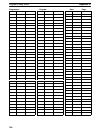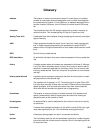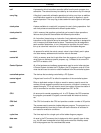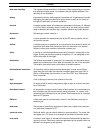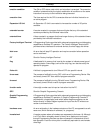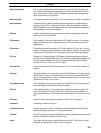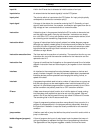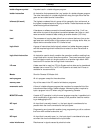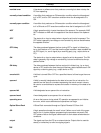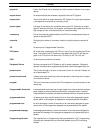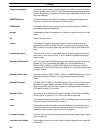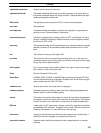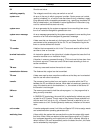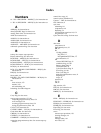
Glossary
207
ladder diagram symbol A symbol used in a ladder-diagram program.
ladder instruction An instruction that represents the ‘rung’ portion of a ladder-diagram program.
The other instructions in a ladder diagram fall along the right side of the dia-
gram and are called terminal instructions.
leftmost (bit/word) The highest numbered bits of a group of bits, generally of an entire word, or
the highest numbered words of a group of words. These bits/words are often
called most significant bits/words.
link A hardware or software connection formed between two Units. “Link” can
refer either to a part of the physical connection between two Units or a soft-
ware connection created to data existing at another location (I/O Links).
load The processes of copying data either from an external device or from a stor-
age area to an active portion of the system such as a display buffer. Also, an
output device connected to the PC is called a load.
logic block A group of instructions that is logically related in a ladder-diagram program
and that requires logic block instructions to relate it to other instructions or
logic blocks.
logic block instruction An instruction used to locally combine the execution condition resulting from
a logic block with a current execution condition. The current execution condi-
tion could be the result of a single condition or of another logic block. AND
Load and OR Load are the two logic block instructions.
LR area A data area that is used in a PC Link System so that data can be transferred
between two or more PCs. If a PC Link System is not used, the LR area is
available for use as work bits.
Master Short for Remote I/O Master Unit.
main program All of a program except for the subroutines.
memory area Any of the areas in the PC used to hold data or programs.
mnemonic code A form of a ladder-diagram program that consists of a sequential list of the
instructions without using a ladder diagram. Mnemonic code is required to
input a program into a PC when using a Programming Console.
MONITOR mode A mode of PC operation in which normal program execution is possible but in
which modification of data held in memory is still possible. Used for monitor-
ing or debugging the PC.
NC input An input that is normally closed, i.e., the input signal is considered to be
present when the circuit connected to the input opens.
nest Programming one jump within another jump, programming a call to a subrou-
tine from within another subroutine, etc.
NO input An input that is normally open, i.e., the input signal is considered to be pres-
ent when the circuit connected to the input closes.
noise interference Disturbances in signals caused by electrical noise.




